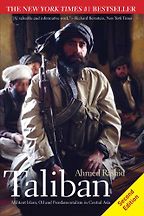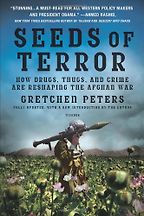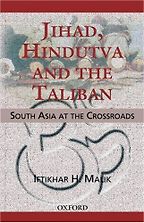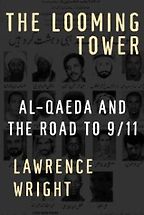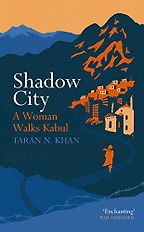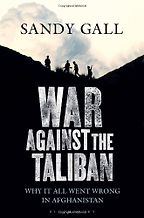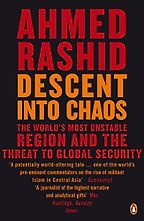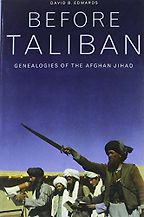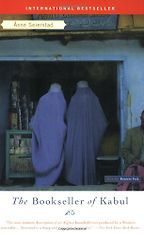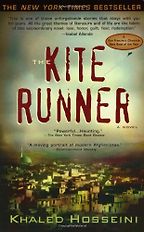Books on the Taliban
Last updated: August 23, 2021
These books will help you understand the rise of the Taliban in Afghanistan, their ideology and their political and social impact over the past three decades. The Taliban emerged as an important force in Afghan politics during the Afghan civil war in of the mid 1990s. Their ideology is a mixture of militant Islamism rooted in the Deobandi strain of Sunni Islam, and Pashtun tribal/cultural practices. By 1996 they had established political control over around three quarters of Afghanistan. They proceeded to impose their ultra-strict interpretation of Islamic law, banning pictures, movies, most music, girls from going to school and women from undertaking most jobs. In March 2001 they destroyed the 1,500 year old Buddhas of Bamiyan. Their rule was overthrown by the American invasion of the country in 2001.
After the American invasion they continued to oppose the occupation of the country and the NATO-backed governments. With the departure of US forces in the summer of 2021 they retook control of the country.
Taliban
by Ahmed Rashid
If you want to understand the Taliban, how they rose to power, and what motivates them, this is the standard work and easily the most accessible. Rashid covers the US approach to the Taliban and the Taliban’s wider role in the support for and spread of militant Islamism globally.
The Seeds of Terror
by Gretchen Peters
This book tells the story of how the heroin trade bankrolls the Taliban and Al Qaeda. Peters paints the Taliban as a large-scale criminal drug dealing operation – with attendant global money laundering sidelines – rather than an ideologically committed religious movement. Peters argues that what is needed is attacks on Afghanistan’s capacity for producing poppies and heroin and the Taliban’s control of that. With the US’s retreat from the country that, of course, has just got a whole lot harder, if not impossible.
Jihad, Hindutva and the Taliban
by Iftikhar Malik
This book puts the jihadi ideology of the Mujahideen and the Taliban into a longer historical perspective, tracing its roots back to the classical Islamic era and looking at the circumstances in which jihad has been advocated since then, through colonial times, up to the present. The book also looks at the growth of religious politics and nationalism in Afghanistan in the light of comparable movements in other countries in the region, such as India, Sri Lanka, Pakistan, Bangladesh and Nepal.
The Looming Tower
by Lawrence Wright
The Looming Tower by Lawrence Wright is one of our most recommended books. It charts the development, beginning in Egypt decades earlier, of the ideology that produced Al Qaeda and led to the attacks on the Twin Towers. It’s a great read and won a Pulitzer Prize. The Taliban is not the central focus of the book, but it’s important background as to why Afghanistan became the home of Al Qaeda and the focus of US military attention in the immediate aftermath of the 9/11 attacks.
Shadow City: A Woman Walks Kabul
by Taran Khan
Indian journalist Taran Khan’s wanderings through Kabul offer a rare glimpse of daily life in the city far beyond the glare of headlines and rolling news. From forgotten tombs to hushed libraries that survived the previous Taliban regime, to the beauty salons and the bright-lit wedding halls where Afghan women shed their inhibitions in privacy, Shadow City wanders the streets of an ‘amnesiac city’ repeatedly remade by war, but still bearing traces of the past should one take the time to notice.
War Against the Taliban
by Sandy Gall
Published in 2012, War Against the Taliban, by the veteran British foreign correspondent Sandy Gall, assesses the challenges facing the country by interviewing Afghans of all stripes, from senior politicians to humble citizens, as well as Western diplomats and soldiers working in the country.
Descent Into Chaos
by Ahmed Rashid
In this book, published in 2009, Ahmed Rashid explores the failure of the US and its allies to suppress militant Islam in Afghanistan and Pakistan in the wake of the terror attacks of 2001. He had great contacts in the government of Pakistan and among politicians and warlords of all factions in Afghanistan. He is also well plugged in to policymaking circles in the West. If the precipitate withdrawal of the US in 2021 was a policy error of epic proportions, this book shows that it was only the latest in a long line of miscalculations and mistakes in the West’s dealing with Afghanistan since 2001.
Before Taliban
by David B Edwards
This book gives the background to the two decades of violence that beset Afghanistan prior to the 9/11 attacks. Edwards looks at the country from the 1960s, exploring how political dreams of progress and prosperity prevalent in the middle years of the century collapsed into civil war and foreign invasion and how this led to the Taliban establishing their rule over the country in the 1990s.
Burqas, Foulards et Minijupes
by Anne Lancelot
This book (only available in French) consists of a series of interviews with women in Afghanistan who lived through the Russian invasion, the civil war and the Taliban. The author, Anne Lancelot, lived in Kabul for eight years working for humanitarian agencies. The book has heartbreaking stories of the ordeals women had to suffer individually and collectively, but it is also an intimate picture of the resilience of women in war.
The Bookseller of Kabul
by Asne Seierstad
The Bookseller of Kabul by Norwegian journalist Asne Seierstad is an international bestseller depicting daily life in Afghanistan over three decades of war and repression, based on the family she lived with in Kabul after the fall of the Taliban in 2001. It’s full of interesting insights into life in Kabul, and in particular the struggles of Aghani women.
The Kite Runner
by Khaled Hosseini
This novel tells the story of Amir, a boy from a wealthy family in Kabul, and his friend Hassan. As children, they are obsessed with running kites. The novel paints a picture of Afghanistan of the 1970s before the Russian invasion, the descent into chaos and the rise of militant Islam.
Reaping the Whirlwind
by Michael Griffin
First published before 9/11 and then updated in 2003, this book focuses on the role of Pakistan (and particularly of the Inter-Services Intelligence or ISI, its intelligence service) and of Saudi Arabia in nurturing and building the Taliban. It also looks at how and why American policy in the 1990s looked on relatively benignly as Pakistan built up the Taliban.
